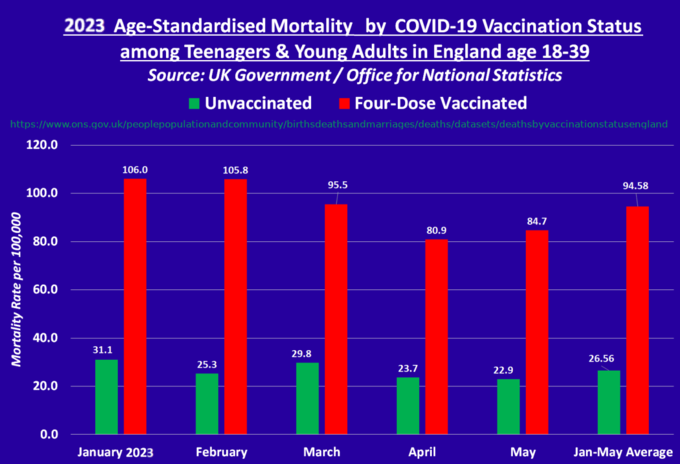Difference between revisions of "ONS"
(ONS changes) |
|||
| Line 25: | Line 25: | ||
}} | }} | ||
These "important questions around mortality by vaccine status" appear, like their answers, not to have been specified. | These "important questions around mortality by vaccine status" appear, like their answers, not to have been specified. | ||
| + | |||
| + | == 2024 Statistical adjustment == | ||
| + | {{YouTubeVideo | ||
| + | |code=NoOgDwhWXYk | ||
| + | |align=left}} | ||
| + | As [[John Campbell]] pointed out, the ONS excess death statistics in 2020-2023 were already significantly lower than those of the [[OECD]]<ref>https://www.youtube.com/watch?v=NoOgDwhWXYk</ref> in February 2024 when the ONS changed their method of calculating all cause mortality statistics, revising upward the number of expected deaths, so effectively reducing the excess mortality statistics.<ref>https://www.ons.gov.uk/peoplepopulationandcommunity/healthandsocialcare/causesofdeath/articles/estimatingexcessdeathsintheukmethodologychanges/february2024</ref> | ||
{{SMWDocs}} | {{SMWDocs}} | ||
Latest revision as of 19:22, 29 March 2024
 The ONS announced in November 2023 that no further data by vaccine status would be published. | |
| The national statistics office, which - in contrast to almost all national statistical authorities, up until 2023 did publish some all cause mortality statistics by COVID jab status. |
The UK Office of National Statistics collects UK statistics.
Contents
Vaccine statistics
In contrast to almost all national statistical authorities, the UK Office of National Statistics did publish some all cause mortality statistics by COVID jab status. Most of these statistics indicate an inverse correlation between death rate and vaccine acceptance, i.e. the death rate is lower for those receiving more jabs. Interestingly, this is however not true of the lowest age category, 18-39.
Care must be taken...
The source points out that Caution must be taken when comparing mortality rates and counts as the characteristics of people in the different vaccination status groups, such as health, may differ, particularly due to the prioritisation of the vaccine to more clinically vulnerable people. While differences in the ages of people in the vaccination status groups are accounted for, other differences, such as ethnicity or level of deprivation, may remain, which can affect the mortality rates and counts.
No further statistics on death by jab status
07 November 2023
We will no longer be updating the Deaths by vaccination status analysis, England series. The last edition was for April 2021 to May 2023, published on 25 August 2023.
This publication was created during the coronavirus (COVID-19) pandemic to answer important questions around mortality by vaccine status in a timely manner.
These "important questions around mortality by vaccine status" appear, like their answers, not to have been specified.
2024 Statistical adjustment
As John Campbell pointed out, the ONS excess death statistics in 2020-2023 were already significantly lower than those of the OECD[1] in February 2024 when the ONS changed their method of calculating all cause mortality statistics, revising upward the number of expected deaths, so effectively reducing the excess mortality statistics.[2]